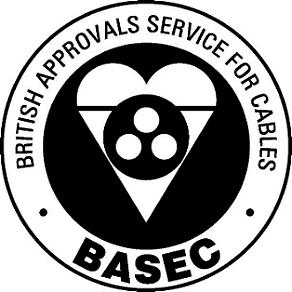Regulation 7 of the new Part P of the Building Regulations requires the use of materials and products that are adequate and proper, and appropriate for the circumstances in which they are to be used. Cables are not excluded, as the British Approvals Service for Cables (BASEC) points out:

Whilst the focus of the Part P changes has been the introduction of the Competent Person schemes to help set a good standard of workmanship, it should be remembered that other aspects of the Building Regulations system also apply to electrical installations. Regulation 7 requires the use of materials and products that are adequate and proper, and appropriate for the circumstances in which they are to be used. By installing cable bearing a BASEC certification, electricians and installers will be able to demonstrate that Regulation 7 has been addressed.
Easy to recognise:
However, should non-certified cable be installed then the risk of non-compliance is introduced. It isn't difficult to recognise BASEC approved cable. The BASEC name appears on the cable sheathing and BASEC logos are prominently displayed on reels or packaging.
Part P does not apply to all new electrical work in dwellings. There are various exemptions for replacements and some simple circuit extension work, but most new work in critical areas including kitchens, bathrooms and gardens is included. The requirements also do not limit the work to being undertaken by a registered electrician. A general builder or competent DIY enthusiast is still permitted to undertake the work, but it must be controlled and checked by Building Control through the building notice or full plans route.
Cable specification an important aspect:
The specification of cables is one of the most important aspects of the Wiring Regulations, particularly conductor sizing and protective earthing. Electricians approved under one of the Competent Person schemes will work to the requirements, but it is possible that some general builders or DIY enthusiasts, may not have sufficient knowledge or experience to get it right every time. Many domestic installations will use flat twin and earth cable to BS 6004:2000 for internal circuits, but there are many other standards, e.g., armoured cable for outdoor use. (A full listing of BASEC approved cables is available on the BASEC website: www.basec.org.uk).
From time to time BASEC has come across examples of cable, being sold in the UK market, which claim compliance with British Standards, such as BS 6004:2000, but which on further investigation and test prove not to have the performance claimed.
Non conformance issues have included undersized conductors, incorrect core colours and poor insulation / sheathing. Anyone with quality concerns relating to the cable being used during Part P work, and requiring advice and guidance, should immediately contact BASEC, on telephone 01908 267300.
More on BASEC:
BASEC was founded in 1971. Its board of management comprises representatives from major manufacturers, the British Standards Institute (BSI), The Institution of Electrical Engineers (IEE), The Building Research Establishment (BRE), the Electrical Contractors Association (ECA) and the National Inspection Council for Electrical Installation Contracting (NICEIC). BASEC was one of the first bodies accredited by the Secretary of State for Trade and Industry, and subsequently the United Kingdom Accreditation Service (UKAS), to provide certifications to National, International and European standards in Quality Management (ISO9001), Environmental management (ISO14001) and various product standards. In addition, BASEC now operates schemes leading to Capability Approval, Certificates of Assessed Design and certification of Health and Safety management systems (OHSAS18001).
For more information by email, please click HERE.